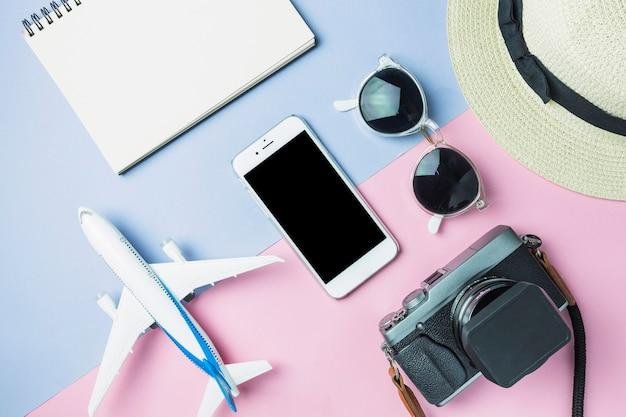The way we travel has undergone a remarkable transformation over the years, thanks to the rapid advancement of technology. From the early days of paper maps and travel agents to the current era of digital solutions, the evolution of travel technology has been revolutionary. Key milestones such as the advent of online booking systems, GPS navigation, and mobile apps have significantly enhanced the convenience and efficiency of travel. Today, we stand on the brink of even more exciting innovations that promise to further elevate our travel experiences.
In the past, planning a trip involved a lot of manual effort and uncertainty. Travellers had to rely on guidebooks, physical maps, and the expertise of travel agents to plan their journeys. The introduction of online booking platforms in the late 1990s marked a significant shift, allowing travellers to book flights, hotels, and rental cars from the comfort of their homes. This was followed by the development of GPS technology, which made navigation easier and more accurate, reducing the stress of getting lost in unfamiliar places.
As we move forward, the integration of artificial intelligence, data analytics, and mobile technology is set to redefine the travel landscape. These innovations are not only making travel more convenient but also more personalised and enjoyable. In this article, we will explore some of the most groundbreaking technologies that are transforming travel experiences today.
Mobile Apps as Travel Essentials
Mobile apps have become indispensable tools for modern travellers. With just a few taps on a smartphone, travellers can access a wealth of information and services that make their journeys smoother and more enjoyable. Apps like TripIt, for instance, consolidate travel itineraries, providing users with a single, easy-to-access platform for all their travel plans. This eliminates the need to juggle multiple emails and documents, making travel planning more efficient.
Beyond itinerary management, mobile apps offer a range of features that enhance the travel experience. Navigation apps like Google Maps and Waze provide real-time traffic updates and turn-by-turn directions, ensuring that travellers reach their destinations without hassle. Language translation apps break down communication barriers, allowing travellers to interact more easily with locals. Additionally, apps like Yelp and TripAdvisor offer reviews and recommendations for restaurants, attractions, and activities, helping travellers make informed decisions.
The convenience of mobile apps extends to financial transactions as well. Apps like Apple Pay and Google Wallet enable secure, contactless payments, reducing the need to carry cash or physical credit cards. This is particularly useful in destinations where card acceptance may be limited. Overall, mobile apps have revolutionised the way we travel, making it more seamless and enjoyable.
AI-Driven Customer Service
Artificial intelligence is playing a pivotal role in enhancing customer service in the travel industry. AI-driven chatbots and virtual assistants are now commonplace, providing travellers with instant support and personalised recommendations. These AI tools are capable of handling a wide range of queries, from booking changes to travel advice, significantly reducing wait times and improving the overall customer experience.
Companies like Expedia and Booking.com have integrated AI-driven chatbots into their platforms, allowing travellers to get quick answers to their questions without the need for human intervention. These chatbots use natural language processing to understand and respond to user queries, making interactions feel more human-like. Additionally, AI can analyse user data to provide personalised recommendations, such as suggesting hotels or activities based on past preferences.
The benefits of AI-driven customer service extend beyond efficiency. By automating routine tasks, AI allows human customer service agents to focus on more complex issues that require a personal touch. This not only improves the quality of service but also enhances job satisfaction for customer service staff. As AI technology continues to evolve, we can expect even more sophisticated and intuitive customer service solutions in the travel industry.
Tailored Travel Itineraries
Personalisation is becoming a key trend in the travel industry, thanks to advancements in data analytics and machine learning. These technologies enable the creation of tailored travel itineraries that cater to individual preferences and interests. By analysing data such as past travel history, social media activity, and online behaviour, travel platforms can offer customised recommendations that enhance the travel experience.
Platforms like Airbnb and TripAdvisor are leveraging data analytics to provide personalised travel suggestions. For example, Airbnb’s algorithm can recommend unique accommodations and experiences based on a user’s previous bookings and preferences. Similarly, TripAdvisor uses machine learning to curate lists of attractions and activities that align with a traveller’s interests. This level of personalisation ensures that travellers have memorable and fulfilling experiences.
The benefits of personalised travel itineraries are manifold. They save travellers time and effort by eliminating the need to sift through countless options. They also enhance satisfaction by ensuring that the chosen activities and accommodations align with the traveller’s tastes and preferences. As data analytics and machine learning continue to advance, the ability to offer highly personalised travel experiences will become even more refined.
Simplifying Travel Planning
Seamless booking platforms have revolutionised the way we plan and book our travels. One notable example is TripIt, founded by Gregg Brockway, which consolidates all travel information into a single, user-friendly platform. TripIt allows users to forward their travel confirmation emails, which are then automatically organised into a comprehensive itinerary. This feature simplifies the travel planning process and ensures that all essential information is easily accessible.
TripIt also offers additional features that enhance the travel experience. For instance, the platform provides real-time flight alerts, helping travellers stay informed about any changes to their schedules. It also offers a premium service that includes benefits such as seat tracking, refund notifications, and VIP travel support. These features make TripIt a valuable tool for both casual and frequent travellers.
The convenience of seamless booking platforms extends to other aspects of travel as well. For example, TripIt integrates with various travel service providers, allowing users to book car rentals, hotels, and activities directly through the platform. This eliminates the need to visit multiple websites and streamlines the entire booking process. Overall, seamless booking platforms like TripIt are making travel planning more efficient and enjoyable.
Unique Travel Experiences
Connecting travellers with unique experiences is a growing trend in the travel industry. GetYourGuide, for instance, is a platform that offers a wide range of tours, activities, and attractions worldwide. Conrad Clarkson, an Account Executive at GetYourGuide, leverages his relationship-building skills to bring new suppliers in the APAC region onto the platform. This ensures that travellers have access to a diverse array of experiences that cater to different interests and preferences.
GetYourGuide stands out by offering curated experiences that go beyond the typical tourist attractions. From cooking classes with local chefs to guided tours of hidden gems, the platform provides travellers with opportunities to immerse themselves in the local culture. This focus on unique experiences enhances the overall travel experience and allows travellers to create lasting memories.
The success of platforms like GetYourGuide highlights the growing demand for authentic and personalised travel experiences. Travellers today are seeking more than just sightseeing; they want to connect with the local culture and have meaningful interactions. By offering a wide range of unique experiences, GetYourGuide is meeting this demand and transforming the way we explore the world.
Comprehensive Travel Solutions
Rome2Rio is another platform that is making waves in the travel industry by offering comprehensive travel planning solutions. Under the leadership of Kirsteene Phelan, Rome2Rio integrates various modes of transportation, including flights, trains, buses, and ferries, into a single platform. This allows travellers to plan their journeys from start to finish, ensuring a seamless and hassle-free experience.
One of the standout features of Rome2Rio is its ability to provide direct booking options for different modes of transportation. This eliminates the need to visit multiple websites and simplifies the booking process. Additionally, Rome2Rio offers offline data integration, allowing travellers to access their travel plans even without an internet connection. This is particularly useful for those travelling to remote areas with limited connectivity.
Rome2Rio’s strategic partnerships with companies like Lonely Planet and SilverRail further enhance its offerings. These collaborations enable Rome2Rio to provide comprehensive travel information and services, making it a one-stop solution for all travel planning needs. By integrating various transportation options and offering direct bookings, Rome2Rio is setting a new standard for travel planning platforms.
Enhancing Travel Services
Strategic partnerships play a crucial role in enhancing travel services and improving the overall travel experience. Rome2Rio, for example, has formed partnerships with companies like Lonely Planet and SilverRail to offer a more comprehensive range of services. These collaborations allow Rome2Rio to provide detailed travel information, including guides and tips from Lonely Planet, as well as seamless rail booking options through SilverRail.
The impact of these partnerships is evident in the enhanced user experience. Travellers can access a wealth of information and services through a single platform, making travel planning more convenient and efficient. For instance, Lonely Planet’s travel guides offer valuable insights and recommendations, helping travellers make informed decisions about their destinations. Similarly, SilverRail’s integration allows for easy booking of train tickets, ensuring a smooth and hassle-free journey.
Strategic partnerships also enable travel platforms to expand their reach and offer more diverse services. By collaborating with other companies, travel platforms can leverage each other’s strengths and provide a more comprehensive range of offerings. This not only benefits travellers but also helps the companies involved to grow and innovate. As the travel industry continues to evolve, strategic partnerships will remain a key driver of enhanced travel services.
Future Trends in Travel Technology
The future of travel technology is brimming with exciting possibilities. One emerging trend is the use of augmented reality (AR) to create immersive travel experiences. AR can overlay digital information onto the real world, providing travellers with interactive guides and enhanced navigation. For example, AR apps can offer virtual tours of historical sites, allowing travellers to learn about the history and significance of a location in an engaging way.
Another promising technology is blockchain, which has the potential to revolutionise travel transactions. Blockchain can provide a secure and transparent way to manage bookings, payments, and identity verification. This can reduce the risk of fraud and streamline the entire travel process. For instance, blockchain-based platforms can offer decentralised booking systems that eliminate the need for intermediaries, resulting in lower costs and faster transactions.
As we look to the future, it’s clear that innovation will continue to drive the travel industry forward. Kashif Khalid, Regional Director, Africa & Middle East, IATA, emphasises the importance of innovation, stating, “Without innovation, the future will be very challenging. We cannot continue building bigger infrastructure with the level of passengers we anticipate, so we have to look at how we manage passengers and cargo differently through digital solutions and innovation.” This sentiment underscores the need for continuous technological advancements to meet the growing demands of the travel industry.
Embracing Technology for Better Travel
In summary, the travel industry is undergoing a significant transformation driven by innovative technologies. From mobile apps and AI-driven customer service to personalised itineraries and seamless booking platforms, these advancements are enhancing the travel experience in numerous ways. Platforms like TripIt, GetYourGuide, and Rome2Rio are at the forefront of this revolution, offering travellers more convenience, personalisation, and unique experiences.
As we embrace these technologies, it’s important to recognise the role of strategic partnerships in enhancing travel services. Collaborations between companies like Rome2Rio and Lonely Planet are providing travellers with comprehensive solutions that simplify travel planning and improve the overall experience. Additionally, the future holds exciting possibilities with emerging technologies like augmented reality and blockchain set to further transform the industry.
Ultimately, embracing technology is key to creating better travel experiences. By leveraging the latest innovations, we can make travel more efficient, enjoyable, and personalised. As the travel industry continues to evolve, staying ahead of technological trends will be essential for meeting the needs and expectations of modern travellers.
















